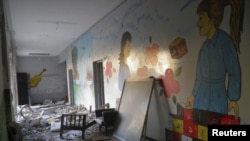DAMASCUS —
Syria's children have suffered the brunt of the year-and-a-half conflict between government and rebel forces, making up half of all those displaced by war.
And for those in school, the war is never far away.
On a recent day at the Zeid Ibn el Khattab elementary school in Damascus, children act like students everywhere. Some squirm in their seats while others eagerly raise their hands to answer a teacher's question.
But their chatter obscures the sounds outside – the thud of explosions on the outskirts of the capital.
One-sided view
Principal Maysa Masoud says that as the war draws near, teachers try to explain the conflict as they see it, explaining there is “a desire to let them know it's a conspiracy" – the view of the war upheld by government officials, that Syria is a victim of foreign aggressors from the West and their Sunni Arab allies.
That lesson is reflected in the hallways of the school, where student drawings depict heroics of the Syrian army and the nation's president, Bashar al-Assad, and foreigners with devil's horns performing political machinations.
The children express confidence in government troops.
“The strong Syrian army protects us," says one young girl, who adds that she is not afraid and calls on God to help them to victory
Prompted by a teacher, a classmate taunts the government's opponents. “Those dogs have ruined the country and we wish old days will come back the way they were," the boy says.
Schools closed, damaged
But the old days are gone.
About 2,000 schools nationwide have been damaged, destroyed or taken over by government or rebel forces.
Parents from Damascus suburbs affected by conflict have been trying to get their children into the relative safety of Zeid Ibn el Khattab, largely because their own schools are closed.
Arifa el Nazer was lucky. Her son's school in the Zamalka suburb has been shut by fighting for almost a year. Explaining that it made her sad to see him miss so much schooling, she was able to get him enrolled.
Reading, writing, and rights
Despite the conflict and the politics, Zeid Ibn el Khattab still offers a basic structure for the children: reading, writing, arithmetic, and even a class on children's rights.
When a teacher asks students to list what those rights should be, one mentions the right to education while another speaks of free expression.
The thought is praised by the teacher, who doesn't mention that the latter is a primary demand of the opposition.
Other students raise their hands, arguing for the right to play.
In a conflict that has left hundreds of children dead, and tens of thousands displaced, the chance to fulfill that last promise – the simple right to play – is becoming increasingly rare.
- Japhet Weeks contributed to this report for VOA.
And for those in school, the war is never far away.
On a recent day at the Zeid Ibn el Khattab elementary school in Damascus, children act like students everywhere. Some squirm in their seats while others eagerly raise their hands to answer a teacher's question.
But their chatter obscures the sounds outside – the thud of explosions on the outskirts of the capital.
One-sided view
Principal Maysa Masoud says that as the war draws near, teachers try to explain the conflict as they see it, explaining there is “a desire to let them know it's a conspiracy" – the view of the war upheld by government officials, that Syria is a victim of foreign aggressors from the West and their Sunni Arab allies.
That lesson is reflected in the hallways of the school, where student drawings depict heroics of the Syrian army and the nation's president, Bashar al-Assad, and foreigners with devil's horns performing political machinations.
The children express confidence in government troops.
“The strong Syrian army protects us," says one young girl, who adds that she is not afraid and calls on God to help them to victory
Prompted by a teacher, a classmate taunts the government's opponents. “Those dogs have ruined the country and we wish old days will come back the way they were," the boy says.
Schools closed, damaged
But the old days are gone.
About 2,000 schools nationwide have been damaged, destroyed or taken over by government or rebel forces.
Parents from Damascus suburbs affected by conflict have been trying to get their children into the relative safety of Zeid Ibn el Khattab, largely because their own schools are closed.
Arifa el Nazer was lucky. Her son's school in the Zamalka suburb has been shut by fighting for almost a year. Explaining that it made her sad to see him miss so much schooling, she was able to get him enrolled.
Reading, writing, and rights
Despite the conflict and the politics, Zeid Ibn el Khattab still offers a basic structure for the children: reading, writing, arithmetic, and even a class on children's rights.
When a teacher asks students to list what those rights should be, one mentions the right to education while another speaks of free expression.
The thought is praised by the teacher, who doesn't mention that the latter is a primary demand of the opposition.
Other students raise their hands, arguing for the right to play.
In a conflict that has left hundreds of children dead, and tens of thousands displaced, the chance to fulfill that last promise – the simple right to play – is becoming increasingly rare.
- Japhet Weeks contributed to this report for VOA.




